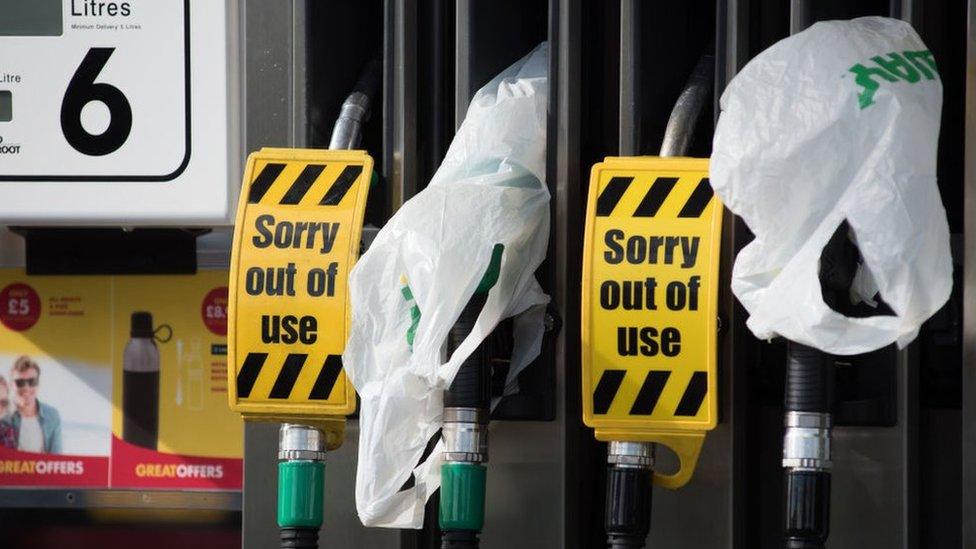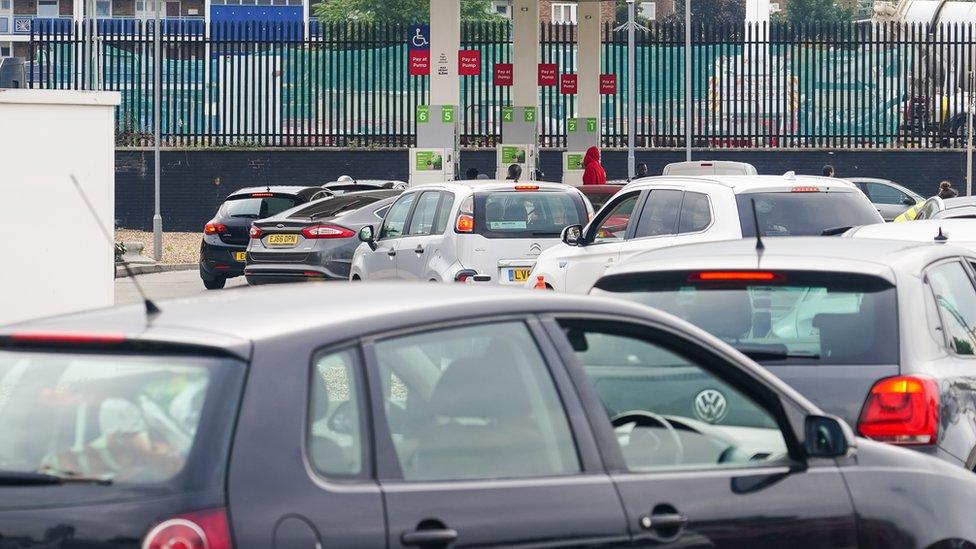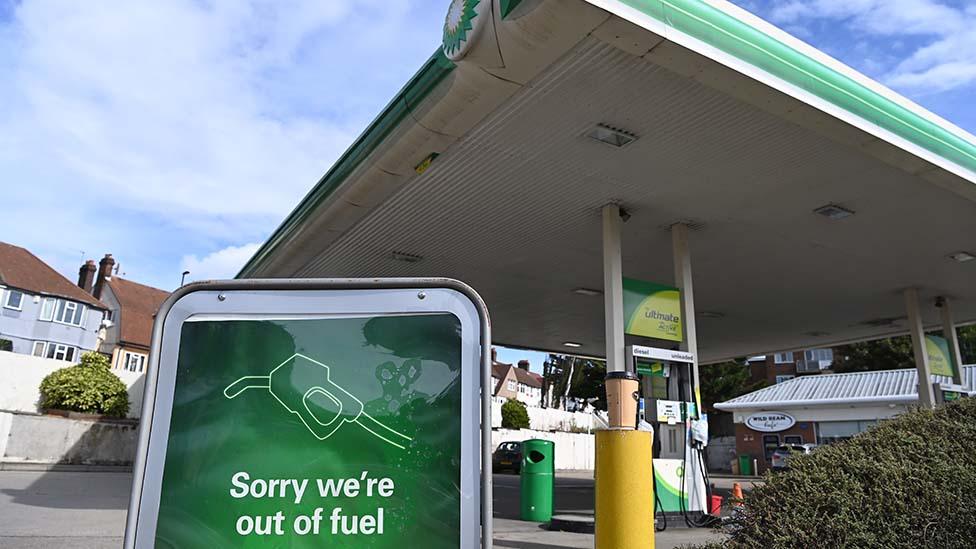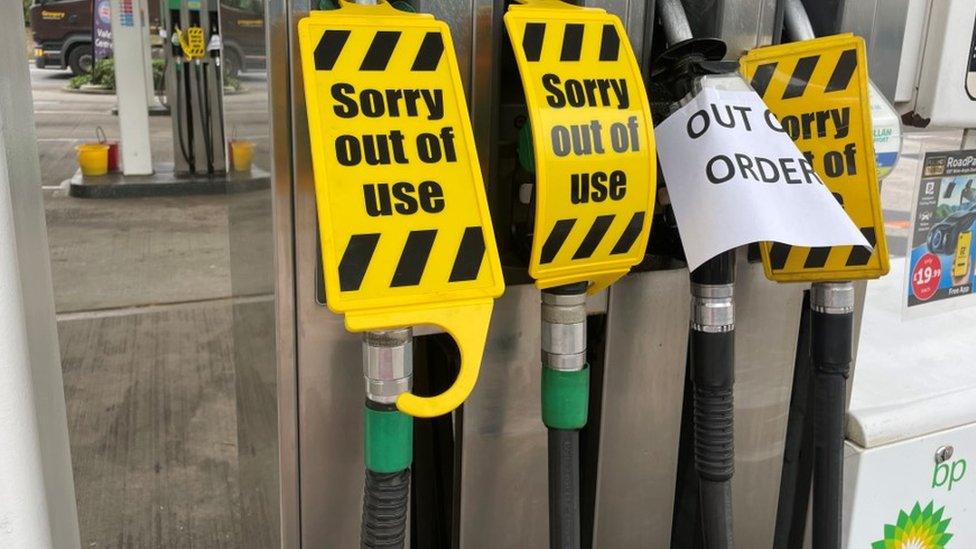Fuel supply: RAC says things improving in many areas
- Published
- comments

The RAC motoring group has said the fuel shortage problem continues to ease, although many areas of the UK are still suffering supply issues.
Smaller fuel stations were still facing major supply issues as drivers fill up for the weekend, the RAC said.
Earlier, BP said problems at its stations caused by a shortage of HGV drivers was starting to improve.
It comes as one of the big fuel delivery firms, Hoyer Petrolog, confirmed it was training army drivers.
The RAC said that on Thursday its patrol vehicles dealt with nearly five times the number of out-of-fuel breakdowns than was typical. However, that was down on the 13-times it dealt with on Monday.
Mr Williams said: While the fuel delivery situation continues to improve in many areas, that's sadly not the case right across the country.
"Those drivers that rely on independent forecourts, especially where there aren't any supermarkets selling fuel, may still be struggling to fill up."
Army drivers
BP was the first company to warn it had to close some petrol stations due to a shortage of drivers, which has worsened due to Covid and Brexit. But the company said on Friday the situation was "stabilising".
A big fuel delivery supplier to BP forecourts and other outlets, Hoyer, confirmed to the BBC it was training army drivers over the last two days.
Hoyer, which delivers to about 25% of the UK's petrol stations, was not able to confirm how many army personnel were being trained nor when they would start work. However, the army drivers will use a mix of Hoyer and military vehicles to make deliveries, the company said.
The UK has been grappling with a fuel crisis that has caused huge queues outside some petrol stations, and forced customers to drive round multiple sites in search of supplies.
BP said the situation had started to improve over the last few days, adding it was "working flat out" to keep sites across the country supplied.
While the government and retailers say there is enough fuel at UK refineries, a shortage of drivers has slowed the transport of fuel to petrol stations.
The haulage industry says an existing shortage of lorry drivers has been made worse by a number of factors, including the pandemic, Brexit, an ageing workforce, low wages and poor working conditions.
Speaking on the BBC's Today programme, policing minister Kit Malthouse said: "My latest briefing is that the situation is stabilising, that we are seeing more forecourts with a greater supply of fuel and hopefully that, as demand and supply come better into balance over the next few days, week or so, that we will see a return to normality."
He added that if the situation started to deteriorate again, Prime Minister Boris Johnson would review matters.
However, Labour leader Kier Starmer said it was time for "emergency action" as the "chaos" looked set to continue.
He said: "We're going to see this driver shortage problem coming back again in different sectors.
"By the government's own admission, their scheme won't be up and running for weeks with the first HGV drivers not on the roads until November. This simply isn't good enough."
He called for the use of the military to get petrol to areas of the country in most need, and for fuel stations with supplies to extend opening hours for NHS shift staff and other key workers.

By Esyllt Carr
"Normally a tanker would last three to four days, but now it's selling out in 12 hours," says Danyal Shoaib, who runs a petrol station near Leatherhead, in Surrey. In the last week he says they've run dry three times.
"I think social media has played a massive part. As soon as anyone sees a tanker, they stick it online and the queues develop all the way down the road," he says.
Mr Shoaib says he's been surprised by the abuse he and his colleagues have faced from "a significant minority" of customers.
"A man tried to bypass the queue and when I politely asked him to join the end, he tried to drive his car into me to get me to move," he says. After he asked the man to calm down, he was then subjected to abusive language including "quite obscene racial slurs", he adds.
Despite this, Mr Shoaib says they've had "loads of lovely messages" thanking them, and seen huge relief on people's faces when they can fill up.
At his petrol station, he says demand remains high: "What we're saying to people is, if you can, please be reasonable. If you can make do with half a tank or three quarters of a tank, please do that."

The BBC understands that demand at supermarkets Asda and Morrisons is also easing, continuing a trend seen throughout the week.
A Morrisons spokesperson said: "It is a rapidly moving situation and we are working hard with our suppliers to ensure we can continue to keep our pumps open and serve our customers."
Sainsbury's, which has more than 300 sites in total, said that it was still experiencing high demand for fuel.
"We're working closely with our supplier to maintain supply and all our sites continue to receive fuel," a spokesperson said.

Tesco added: "We have good availability of fuel, and we're working really hard to ensure regular deliveries to our petrol filling stations across the UK every day."
The firm operates 500 petrol stations, with another 200 managed by Esso with a Tesco Express store on-site.
An Esso spokesman told the BBC that a number of its Tesco Alliance sites were affected.
"The picture is constantly changing, but the situation at the 200 Esso Tesco Alliance sites is stabilising and continues to improve in terms of fuel availability," they said.


Like a car running low on petrol, the situation at the pumps seems to have slowed and possibly stalled.
Fuel demand is still far from normal and the picture is very patchy.
While there are hopeful noises from some areas of the industry that fuel is getting through, those who are selling it are still seeing queues, particularly in London and the south east.
The situation is not as bad as last weekend, but it still isn't over. The messaging could be tricky for the government. Tell everyone the crisis is solved before it dies down, and ministers risk losing the public's trust.
The question now is what will reassure the public to go back to normal buying?

The Petrol Retailers Association (PRA), represents nearly 5,500 of the UK's 8,300 petrol stations
It said on Friday there had been little change for its members who are independent fuel retailers.
Its survey of 1,100 sites across the UK found that 26% had neither petrol nor diesel in stock, down slightly from 27% on Thursday.
Gordon Balmer, its executive director, said: "Whilst the situation is similar to recent days, there are signs it is improving, but far too slowly.
"Independents, which total 65% of the entire network, are not receiving enough deliveries of fuel compared with other sectors."
Mr Balmer said he believed queues were likely until independent retailers started getting more frequent deliveries.
Driver hours extension
In an attempt to limit disruption, the government has confirmed that 5,000 fuel tanker and food lorry drivers can receive temporary UK visas, with the scheme ending on Christmas Eve.
A temporary relaxation on drivers' hours has also been extended, external until 31 October. This allows the daily driving limit to be increased from nine hours to 10 hours up to four times in a week.
A government spokesperson said it had taken "immediate action" to increase the supply of HGV drivers and relieve the pressure on petrol stations.
"We recognise the challenges facing industry and streamlined the testing process in July to boost the number of drivers," they said, adding that it was important people continued to buy fuel as normal.
Related topics
- Published5 October 2021

- Published23 September 2021
